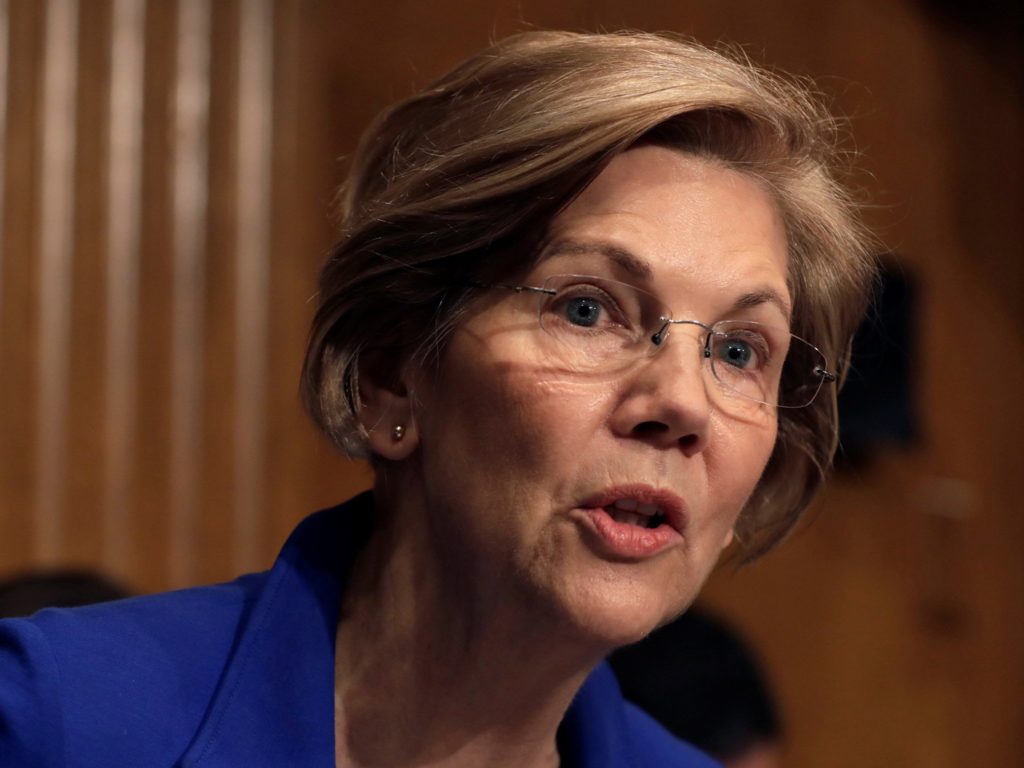Sen. Elizabeth Warren seized on criticism Tuesday from two potential presidential rivals who are billionaires to highlight her proposal to raise taxes on top earners.
Former New York City Mayor Michael Bloomberg blasted the Massachusetts Democrat’s “ultra-millionaire tax” as “probably unconstitutional.” During a two-day visit to the early voting state of New Hampshire, Bloomberg said “we shouldn’t be embarrassed by our system” and warned against a slide toward Venezuela’s imploding socialist economy. His comments followed a jab from former Starbucks CEO Howard Schultz, who called Warren’s plan “ridiculous” in an NPR interview.
In an interview Tuesday, Warren said the tax is necessary and dismissed the criticism from Bloomberg and Schultz, who are both considering using their wealth to fund a presidential campaign.
“Another billionaire who thinks that billionaires shouldn’t pay more in taxes,” she told The Associated Press. “No surprises — but that’s also not how we’re going to build a future for this country.”
Warren formed a presidential exploratory committee last month. She unveiled a proposal last week that would add a 2 percent tax to U.S. households with net worth greater than $50 million, increasing it to 3 percent for net worth greater than $1 billion. Economists advising Warren project the new levy would hit less than the top 0.1 percent of households and that it would raise $2.75 trillion over 10 years.
It comes as the early days of the Democratic primary are dominated by a debate over the risks of staking out positions that opponents could brand as too liberal. Bloomberg, who is eyeing a White House run as a Democrat, has urged caution on policies related to taxes and health care. Schultz, who said this past weekend he’s considering running for president as an independent, is also seeking to appeal to moderate voters.
Conservatives have lambasted Warren’s idea as a violation of constitutional prohibitions on “direct” property taxes that are not applied proportionally to specific states, a criticism that Bloomberg echoed on Tuesday even as he allowed room to debate the current state of income tax rates.
“People earn money to pay their taxes, and then they don’t expect the government to come back and take some of it away,” he told reporters. “I think you can question whether or not we have the right tax rates.”
Bloomberg noted that he criticized the tax cuts President Donald Trump and the GOP passed in late 2017 as overly skewed toward the wealthy, even as he linked Warren’s proposal to the failings of socialism in South America.
“If you want to look at a system that is not capitalistic, just take a look at what was perhaps the wealthiest country in the world and today people are starving to death. It’s called Venezuela,” Bloomberg said.
But Bloomberg faces a steep climb in a Democratic party where more liberal candidates have captured early buzz, and Schultz is traveling an even harder road as Democrats fume that his candidacy could siphon votes from their nominee. That makes their animosity politically beneficial to Warren, who will face stiff competition from California Sen. Kamala Harris and her proposal for new middle-class tax credits as a means to boost economic equality.
Progressive Change Campaign Committee co-founder Adam Green, whose activist group backs Warren’s nascent presidential bid, underscored the upside for Warren in taking on two ambitious multi-billionaires over her tax plan. “Not since ‘Nevertheless, She Persisted’ has a bigger political gift been handed to Elizabeth Warren than out-of-touch billionaires attacking her for wanting to tax their wealth to open up health care and educational opportunities for millions of voting Americans,” Green said.
(AP)












One Response
This is old – but cant help thinking it belongs here…
The Tax System Explained – Using a Beer Analogy
Suppose that once a week, ten men go out for beer and the bill for all ten comes to £100. If they paid their bill the way we pay our taxes, it would go something like this…
The first four men (the poorest) would pay nothing.
The fifth would pay £1.
The sixth would pay £3.
The seventh would pay £7.
The eighth would pay £12.
The ninth would pay £18.
And the tenth man (the richest) would pay £59.
So, that’s what they decided to do.
The ten men drank in the bar every week and seemed quite happy with the arrangement until, one day, the owner caused them a little problem. “Since you are all such good customers,” he said, “I’m going to reduce the cost of your weekly beer by £20.” Drinks for the ten men would now cost just £80.
The group still wanted to pay their bill the way we pay our taxes. So the first four men were unaffected. They would still drink for free but what about the other six men? The paying customers? How could they divide the £20 windfall so that everyone would get his fair share? They realized that £20 divided by six is £3.33 but if they subtracted that from everybody’s share then not only would the first four men still be drinking for free but the fifth and sixth man would each end up being paid to drink his beer.
So, the bar owner suggested that it would be fairer to reduce each man’s bill by a higher percentage. They decided to follow the principle of the tax system they had been using and he proceeded to work out the amounts he suggested that each should now pay.
And so, the fifth man, like the first four, now paid nothing (a100% saving).
The sixth man now paid £2 instead of £3 (a 33% saving).
The seventh man now paid £5 instead of £7 (a 28% saving).
The eighth man now paid £9 instead of £12 (a 25% saving).
The ninth man now paid £14 instead of £18 (a 22% saving).
And the tenth man now paid £49 instead of £59 (a 16% saving).
Each of the last six was better off than before with the first four continuing to drink for free.
But, once outside the bar, the men began to compare their savings. “I only got £1 out of the £20 saving,” declared the sixth man. He pointed to the tenth man, “but he got £10!”
“Yeah, that’s right,” exclaimed the fifth man. “I only saved a £1 too. It’s unfair that he got ten times more benefit than me!”
“That’s true!” shouted the seventh man. “Why should he get £10 back, when I only got £2? The wealthy get all the breaks!”
“Wait a minute,” yelled the first four men in unison, “we didn’t get anything at all. This new tax system exploits the poor!” The nine men surrounded the tenth and beat him up.
The next week the tenth man didn’t show up for drinks, so the nine sat down and had their beers without him. But when it came time to pay the bill, they discovered something important – they didn’t have enough money between all of them to pay for even half of the bill!
And that, boys and girls, journalists and government ministers, is how our tax system works. The people who already pay the highest taxes will naturally get the most benefit from a tax reduction. Tax them too much, attack them for being wealthy and they just might not show up anymore. In fact, they might start drinking overseas, where the atmosphere is somewhat friendlier.
For those who understand, no explanation is needed.
For those who do not understand, no explanation is possible.